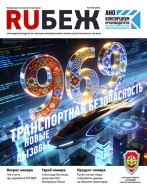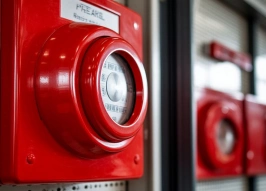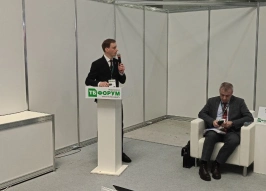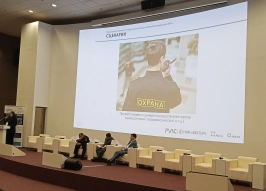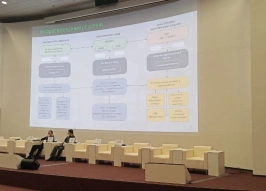Law Of The Future
 State Duma received a draft of the law "On industrial policy in the Russian Federation" for consideration. The authorities were talking about the necessity of such law for several years, but developers from the Ministry of Industry and Trade had finally finished the document only recently in connection with the introduction of import substitution policy. Deputies will address the fate of the law in the autumn session of 2014. The document contains a number of important regulations. In particular, transition to the system of returnable financial support of the industry. Meanwhile, experts say that the adoption of the law in its present form will not be sufficient for the transition to the new system. RUBEZH magazine editorial staff had prepared an overview of the most important sections of the document. At our request, Vladimir Gutenev, first deputy chairman of the State Duma Committee on Industry, first vice president of the Russian Engineering Union, provided his comments on the draft law.
State Duma received a draft of the law "On industrial policy in the Russian Federation" for consideration. The authorities were talking about the necessity of such law for several years, but developers from the Ministry of Industry and Trade had finally finished the document only recently in connection with the introduction of import substitution policy. Deputies will address the fate of the law in the autumn session of 2014. The document contains a number of important regulations. In particular, transition to the system of returnable financial support of the industry. Meanwhile, experts say that the adoption of the law in its present form will not be sufficient for the transition to the new system. RUBEZH magazine editorial staff had prepared an overview of the most important sections of the document. At our request, Vladimir Gutenev, first deputy chairman of the State Duma Committee on Industry, first vice president of the Russian Engineering Union, provided his comments on the draft law.
Text: Dmitry Voronin
Vladimir Gutenev, first deputy chairman of the State Duma Committee on Industry, first vice president of the Russian Engineering Union: "Industrial community has long awaited the appearance of a law fundamental in terms of economic development of the country. Previous attempts to create such document were unsuccessful. In my opinion, the proposed law is closest to modern realities."
Looking Back
The law leaves an immediate impression that Russia will really have to start with the basics in attempts to develop industry. Introductory part of the document establishes a set of definitions customary for industrialized countries, but Russia will have to master these concepts following the adoption of the document. In addition to defining terms as industrial policy, industrial production and industrial infrastructure, the document also offers the following definitions.
Development of production - a set of measures providing preparation of industrial activity subjects for manufacturing of new industrial products, or for a significant (two times or more) increase in the number of previously manufactured products – including preparations for commissioning of basic facilities, as well as development of technological processes and mastering of practical methods of industrial products manufacturing.
Industrial products for which there are no alternatives produced in the Russian Federation, - industrial products, which cannot be replaced by products manufactured on the territory of the Russian Federation with similar technical and operational characteristics, carrying the same functions and commercial interchangeability.
Industrial park – a set of industrial infrastructure facilities controlled by a specialized commercial managing organization and designed for the realization of new industrial production chains or for implementation of industrial production modernization.
Industrial cluster - a set of industrial activity subjects related to each other by territorial proximity and functional dependence, and located on the territory of one or more subjects of the Russian Federation.
Integrated structure of the military-industrial complex – while not a juridical person, an association of leading joint venture legal entities, created by the President of the Russian Federation and the Government of the Russian Federation and in which one person has the right to determine decisions, approvable by other individuals.
Industrial activity promotion (stimulation) measures - a set of actions of legal, organizational and economic nature carried out by public authorities and local self-governing authorities, as well as by industrial infrastructure supporting organizations in order to increase productivity and amount of investments to the industrial sector of economy.
State information system of industry – federal information system containing information on the status of industry branches in the Russian Federation and forecasts for future development.
Special investment contract - a contract between the Russian Federation and an investor establishing repayments of stimulating nature if the investor accepts obligations aimed at the creation or development of industrial production.
Hopes For The Best
The authors claim a set of very specific objectives pursued by the law "On industrial policy in the Russian Federation" - sustainable and innovative development of industry, import substitution and increase of competitiveness for Russian industrial products in the world market. As follows from the objectives, industrial sector should actively develop manufacturing of products for which there are no alternatives produced in the Russian Federation. At the same time, companies must focus on the implementation of import substitution and resource-saving technologies. The State in turn will provide stimulation of production (creation of job opportunities, attraction of investments to national industry), and the organization of sales markets. The state also promises assistance for exporters in the promotion of Russian industrial products in foreign countries. However, the law mostly promises direct stimulation of domestic producers within the framework of state order. The law sets the direct priority of industrial products manufactured in Russia over industrial products produced in foreign countries. By 2017, the government intends to set the 20% limit for the share of foreign industrial products in the total volume of procurements.
Executive branch of the government will develop tools and mechanisms for the implementation of priority for Russian goods. In some areas of the industry, such priority has already been established. In particular, government decree № 1224 of December 24, 2013 establishes a prohibition on the purchase of foreign products for the needs of national defense and national security. In July 2014, the Prime Minister signed a prohibition for the purchase of foreign-made cars by state and municipal agencies. However, products of foreign brands assembled on the territory of Russia will be able to participate in tenders only if foreign companies ensure a certain level of localization of production. Currently, the required level is at 30-40%, and by 2018 it should reach 60-70%.
Vladimir Gutenev:
"It is imperative now to implement two approaches that can dramatically improve the pace of high-tech industry development. The first – quick implementation of import substitution programs and fulfilling of the task for creating 25 million new high-tech job opportunities. The second essential approach is protectionism policy. This thesis will be carried out by the establishment of priority of domestic goods over foreign alternatives, by introducing restrictions on the import of goods from foreign countries in accordance with the laws 44-FZ and 223-FZ.
It is important to use the significant amount of state order in the interest of domestic producers, enabling them to update their technological base. With indisputable priority, we must consider the territory and the proportion of localization for industrial products".
Self-sufficiency principle
The fundamental statement of the new law – provision of financial support for the industry. In the first place, this scheme will be used to finance research and development activities (R&D) in civil industry. The authors from the Ministry of Industry and Trade essentially offered to introduce the principle of self-supported developments and formulated the basic principles of obtaining government money for their implementation. Firstly, the financial support is provided on a return basis in the form of tax benefits and subsidies, with the use of competition mechanisms. Criteria for funding decisions should include consideration of the effectiveness of support measures. Secondly, the priority will be granted to projects that will prove "relevant to the objectives and tasks of the Russian Federation state programs". For instance, these include state order supply arrangements. Finally, the third principle involves the establishment of penalties introduced in case state support recipients fail to provide perjured performance. The amount of sanctions, according to the document, equates to the amount of provided assistance.
By the way, the law has a "hidden" – outside the section on financial support – way of obtaining state support. Companies that exercise Innovative activities in the provision of engineering services, as well as companies that implement projects for the improvement of environmental safety of industrial production can also count on subsidies.
The law does not contain any mention of specific sources of subsidy, for example in the form of already existing or purposely created funds. According to experts, it is very likely that this section will be substantially amended or changed during the consideration process in State Duma.
Meanwhile, on August 28, Russian Prime Minister Dmitry Medvedev signed a decree on the formation of the Industry Development Fund, which should become a source of subsidy. The Fund will be created on the basis of the Russian Foundation for Technological Development, which formerly was under the jurisdiction of the Ministry of Technological Development and then was transferred to the Ministry of Industry and Trade by the order of the prime minister. For the next three years, there are plans for allocating 18.5 billion rubles to the fund. Funding of the first projects is scheduled to begin in 2014.
Vladimir Gutenev:
"The idea of creating one or more industry development funds, which could become a source of easy and "long" money for investment projects, has been widely discussed.
There was a proposition for the creation of three industrial funds, which would lend resources for the modernization of enterprises – with 2-3% annual interest rate for 10 years, with total amount of 38 billion rubles. The National Security Fund and the Reserve Fund were to become the sources of funding.
However, the discussed law does not contain such provisions. It says that financial support will be provided on a repayment basis in order to ensure the access of enterprises to long-term debt financing on competitive terms – and that is a very big difference.
In our view, we need to reconsider this issue once more. After all, the establishment of such funds could eliminate the injustice, which, unfortunately, afflicts financial institutions. We all have fresh memories of practice of banks, including state-owned, which, after the crisis of 2008, while receiving state budget financing for their working capital, adjusted the margin of extra charges and credited the real sector of economy with the income of 10, 12, 14% of their rate.
And soon, many enterprises laden with extremely heavy credit resources went bankrupt, jobs were lost, asset complex had to be reoriented. The economy suffered significant damage.
Therefore, the idea for the creation of mechanisms that could give our enterprises access to "long" money on terms comparable with foreign competitors is productive and necessary. In my opinion, other support mechanisms could also be used. For example, Central Bank could provide target credit resources to commercial banks for the development of industry, while also limiting the margin of extra charges. At the same time, these resources must only be used for their target purpose and should not be released to the interbank credit market. There should be very strict time terms of transferring loans to enterprises – let us say, a week or less – and there should be penalties if these resources are used for some other purposes. Then, while limiting extra charges by 2-4%, it would be possible to provide industrial enterprises with inexpensive and “long” money for their working capital."
The fundamental statement of the new law – provision of financial support for the industry.

Help With Repayments
Another dismissal of previous industry support schemes relates to new productions. The special investment contract is designed to replace the previous forms of dialogue on this subject between businesses and the government. The idea of the contract is simple - the state does not provide budgetary or state-owned property investments to the investment object. The state no longer carries the “investor” status - this is the main difference from the adopted concession agreements on public-private partnerships. Instead, the state provides the so-called stimulating withdrawals:
- benefits on rent payments for the use of state and municipal property, including land property;
- reduced prices for goods, works and services that are subject to government regulation;
- other benefits and preferences set by the current legislation.
The contract validity is established for up to 10 years. The Ministry of Finance participates in the process of contract conclusion – this is one of the requirements of the law. Meanwhile, the state will not have ownership rights for the created objects. For the duration of the investment contract, the possibility of changing the amounts and the list of benefits is forbidden.
The contract is concluded between the state and investor(s) to achieve the following goals:
- creation or development of industrial products, for which there are no alternatives produced in the Russian Federation;
- creation or development of prioritized industries;
- creation or development of industrial products through the introduction of intellectual resources related to the prioritized areas of science, engineering and technology, or to critical technologies;
- implementation of the best available technology to industrial production;
- creation of high-performance workplaces;
- establishment of industrial and social infrastructure.
As explained by the developers, the economic effect of the investment contract is not aimed at obtaining state property ownership, but is aimed at the creation of marginal product, new job opportunities, and tax revenue from new businesses.
Vladimir Gutenev:
"The provision on the investment contract is one of the major advantages of the proposed law. In the absence of law on public-private partnership, it will allow to implement large investment projects in the interests of both the state and investors.
These will be investment contracts on the development of industrial production without analogues, products with high priority for the social and economic development of the country. Such contracts will benefit projects for the implementation of important technology to industrial production and to other important areas.
However, the current set of provisions on such contracts is of very complex legal nature and requires substantial revision. In particular, it says nothing about tender competition and its role in the conclusion of such contracts. If it is assumed that the basis has to be non-competitive, then this would require changes to the law "On Protection of Competition". The same applies to leasing real estate and land areas to investors without competition.
The proposed freezing of tariffs for more than one year will require changes to the federal laws "On Heat Supply" and "On Electric Power Industry". It will also require changes to the Tax Code and the Budget Code. Therefore, the implementation of regulations on investment contracts will not be an easy task. Nevertheless, these regulations would eliminate the impact of regulatory acts that can hinder business conditions established in investment contracts. It is also important to add some provisions on the protection of intellectual property."

Under A Single Registry
In order to understand clearly which companies should receive support and to decide what methods should be applied, the Ministry of Industry and Trade offers to gather information about industrial companies in one place. A whole separate section of the document is devoted to the creation of the state information system of industry. The future system (SIS, ru: GIS)- should contain the following information:
- industry status and development prognosis;
- information about the subjects of industrial activity;
- about forecasts and actual output of basic industrial products – including sectoral detalization;
- about the use of resource-saving technologies and renewable energy sources;
- about state and municipal programs adopted for the implementation of industrial policy;
- about incentive measures provided by relevant state and municipal programs;
- about the performance of support measures, provided at the expense of the federal budget;
- about the forecasts on the development of industrial branches of the Russian Federation; the composition of industry is determined by the Government of the Russian Federation;
- about the workforce capacity of industrial activities subjects and needs for personnel.
The draft law offers the allocation of 43 161 million rubles from the state budget for the development of SIS in 2105 – the only specific figure in the law. Maintenance of the system will cost another 4,04 million rubles annually. However, neither the law nor the explanatory note mentions the possibility of using existing organizations databases –such as regional registry of legal entities and online catalogs, such as the "2GIS" system. Apparently, the authors decided to create something new from scratch.
Vladimir Gutenev:
"I don’t think that the Ministry of Industry and Trade see their ultimate goal in the re-establishment of State Planning Committee, although the practice of inter-branch linking seems like a highly viable move for the optimization and improvement of the effectiveness of state sectoral management.
I am positive about the creation of state information system, the only condition for the implementation of which requires the introduction of such a strict and mandatory criterion as the efficiency of obtained results. We often encountered the situation when substantial amounts of resource allocated for development activities in certain sectors did not bring real results. And even when the state offered to buy the current results from developers or enterprises for a nominal fee, they refused, as they were interested not in actual research, but in the funds allocated for the continued development. Therefore, I think the gathering and analysis of information will increase the efficiency of industry and science."
Military Discipline
The law on industrial policy emphasizes the priority of the military-industrial complex (MIC). For example, the document draws a line between the rules for civil and defense industries, while preserving the already traditional tool of R&D funding for MIC - through contracts within the framework of defense order without requirements for efficiency indicators. On the other hand, the reasons for such approach are rooted in the current state of the defense industrial sector, which is reflected in the objectives set out to provide support for the sector:
- Creation of an effective system of regulation of industrial activities of the military-industrial complex organizations;
- transformation of production and technological capacity of organizations of the military-industrial complex into an efficient innovative resource that would be used in the creation of modern weapon systems.
In some aspects, the methods of MIC support are directly opposite to those used for civil production. Here, the government intends to control everything – and very strictly. Beginning with mechanisms of non-competitive conclusion of state defense order contracts with individual suppliers and prepayment of services of organizations engaged in the fulfilment of defense order to state regulation of prices for the products supplied within the framework of the state defense order, and prevention of bankruptcy of organizations of the military-industrial complex.
The government will have corresponding demands for providing such preferences to contractors. The draft law establishes subsidiary liability for contractors of the military-industrial complex for underperformance in the fulfilment of defense order. Responsibility of organizations of the military-industrial complex for underperformance in the production of military products will also be tightened.
Average workload level of manufacturing capacities in Russia
Vladimir Gutenev:
"The importance of provisions related to the military-industrial complex in the law is truly fundamental.
For the first time since the post-Soviet era there is an attempt to create a legislative definition of the very term “military-industrial complex” – to this day, such definition does not exist, despite frequent references in a variety of documents, including those of state importance. The law also introduces the legal definition of the “Integrated structure of the military-industrial complex” – also a frequently used term, yet equally without an official definition.
I would like to discuss certain provisions related to the military-industrial complex. For example, the law says that the composition of the military-industrial complex is determined by the Consolidated Register of Organizations of the Military-Industrial Complex, which is formed and maintained by the Ministry of Industry and Trade of the Russian Federation. Currently, the register holds 1341 companies of different legal forms in various branches of industry - federal state unitary enterprises (ru: FGUP), OJSCs (ru: OAO), LLCs (ru: ZAO), and state-owned enterprises. The registry, however, does not mention integrated structures, state corporations, ministries and agencies, even the Military-Industrial Commission under the Government of the Russian Federation is not listed. The definition of the “Integrated structure of the military-industrial complex” concept also raises some questions.
Back In Formation
According to the draft law, The Council on Industrial Policy under the President of the Russian Federation will take on the responsibilities for tactical management of industrial policy. The structure and functions of the legal body is only described in general terms in the current version of the law, but in the future, it is expected that there will no doubts in the higher status of the future areopagus of industrial policy. Precisely, the Council "will present the proposals on the formation and implementation of industrial policy to the President of the Russian Federation and the Government of the Russian Federation, the Council will coordinate the implementation of stimulation measures for industrial activity carried out by federal executive bodies." The Council will include representatives of the following legal persons and organizations:
- President of the Russian Federation;
- Government of the Russian Federation;
- relevant committees of both chambers of the Federal Assembly;
- Civic Chamber of the Russian Federation;
- federal executive authorities responsible for the development of the foundations of state policy and legal regulation in the sphere of budget, tax affairs, science, education, analysis of social and economic development, enterprise development, social and economic development of the Russian Federation subjects, municipal facilities and agriculture;
- subjects of industrial activity and infrastructure support of industry, national and sectoral associations of employers, scientific and educational communities, including the Russian Academy of Sciences, and expert organizations.
Vladimir Gutenev:
"The draft law in its current state has a number of ambiguous moments. For example, it is questionable whether it is appropriate to create a single federal body authorized to form industrial policy with planning horizons of 6 or 12 years and link this policy with the resources necessary for its implementation, just like it is provided by the current law on strategic planning."
Exporting Stuff
The issue of foreign markets development is also brought up in the law. The developers of the draft law promise to assist in the promotion of Russian industrial products on the markets of foreign countries, as well as to create favorable conditions for the subjects of industrial activities engaged in exporting of industrial products produced in Russia, including state insurance arrangements protecting exporters and their investments from risks connected with crediting and political influence.
Experts suggest perceiving this section positively if for no other reason than because the support measures for exporters are included in the program paper on the industrial policy of the state.
Vladimir Gutenev:
"We need to consider the expansion to foreign markets. Each state, which wants to grow its own industrial production, should not be limited by the capacity of its own market despite the amount of resources it possesses.
From this perspective, we can only welcome the proposed support measures for the promotion of Russian products on foreign markets through a variety of mechanisms, including the creation of comfortable environment for exporters, provision of financial and material support, and provision of government insurance arrangements. This includes productions, where the percentage of participation of Russian companies is not very high – we are talking about partial insurance. Generally speaking, if 20% of the cost of a certain product relates to Russia, then the state can cover even those 20%."
The Art Of Waiting
Already, experts say: the fate of the Russian industry will not be decided by just the adoption of the law in State Duma. Annex to the document contains 11 regulatory acts, which must be developed and adopted so that the law itself could start working. Consequently, the rules for the many key points cannot just change - they have yet to be developed, and it will take time. Thus, the creation of the requirements for industrial parks, as said in the draft law, will take 60 days, and it will take up to a year since the adoption of the law to develop the procedure of creation and establishment of further operation of the state information system of industry. Meaning that the law will bring the first real results in the long run, not immediately. This is one of the critical vulnerabilities of the law – there is no ready mechanism of implementation. The transparency of actual realization - this is exactly what distinguishes the law of the future from the law of today.
Vladimir Gutenev:
"This document is not a directly applicable law. To a large extent, its influence will be determined by actual law enforcement practice, and by willingness of executive authorities and civil institutions to effectively use this new mechanism. That is, the presence of such law is a necessary but not a sufficient condition to ensure the successful development of domestic industry in all directions.
Generally speaking, I think that the law on industrial policy is a very important building block in the foundation of the Russian industry. Therefore, its development must be addressed with great thoroughness – we will insist on this as the document will be gradually improved."
Источник: RUБЕЖ


